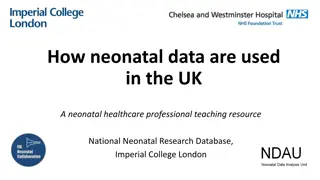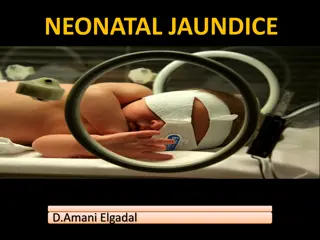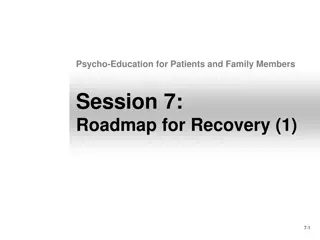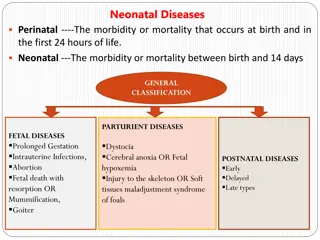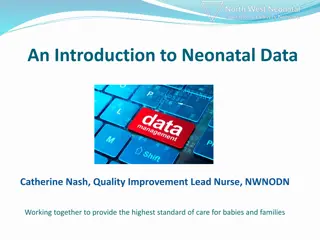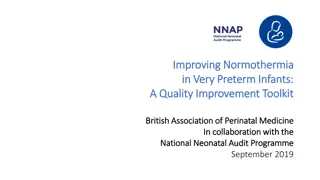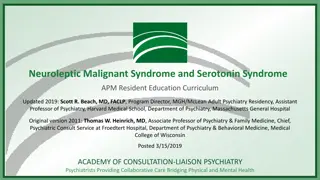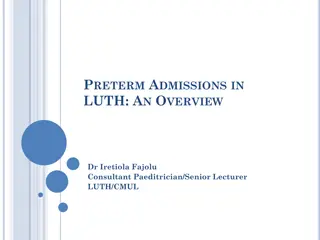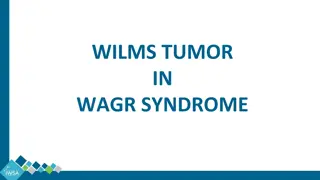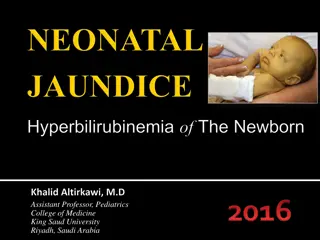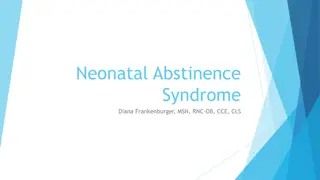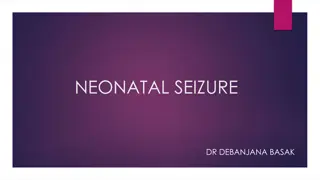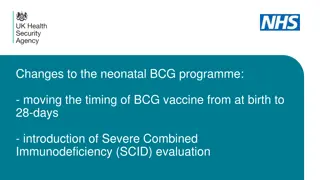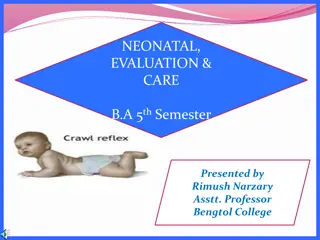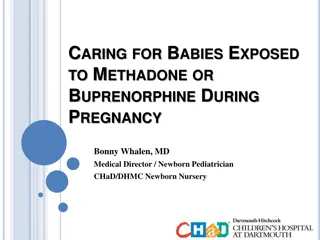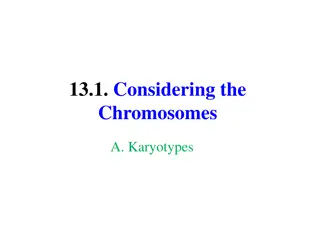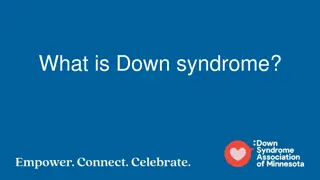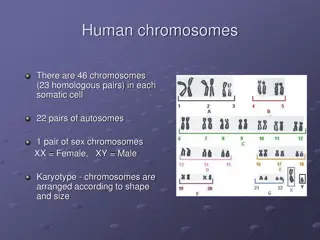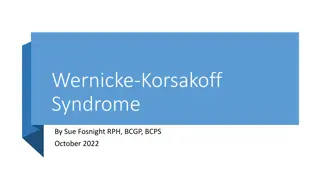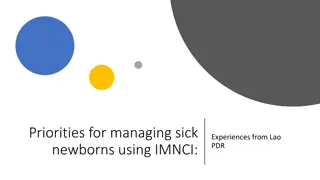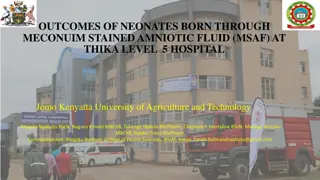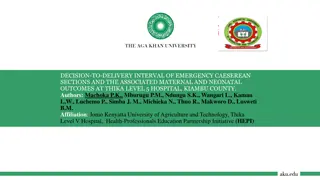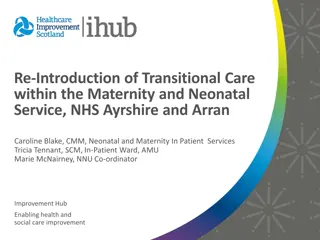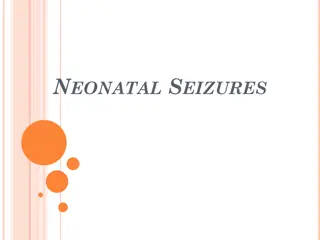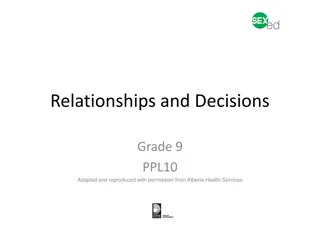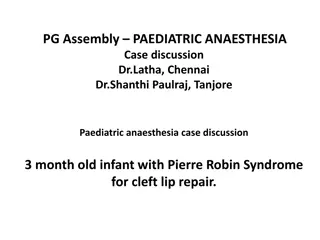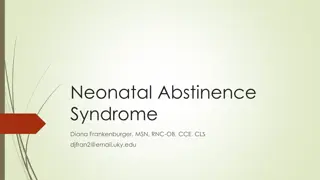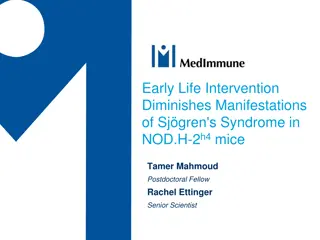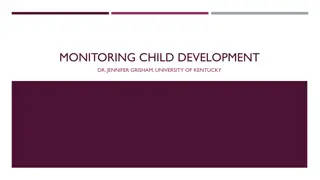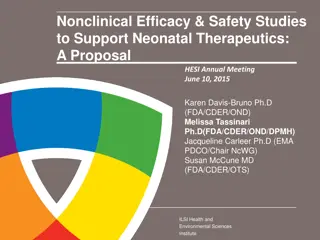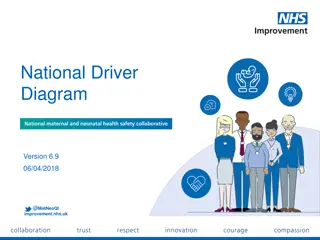Understanding Neonatal Data Usage in the UK Healthcare System
Neonatal data plays a crucial role in assessing the quality of care provided to newborns in the UK. This resource from the National Neonatal Research Database at Imperial College London sheds light on how neonatal data is collected, utilized, and shared among healthcare professionals. The importance
1 views • 24 slides
NEONATAL JAUNDICE
Neonatal jaundice, a common condition in newborns, results from elevated bilirubin levels. While often benign, high levels can lead to complications like kernicterus. Recognizing risk factors, limitations of clinical assessment, and appropriate evaluation and treatment are crucial in managing neonat
1 views • 48 slides
Understanding the Roadmap to Recovery from Substance Use
This session provides insights into the stages of recovery from substance use, including withdrawal, early abstinence, protracted abstinence, and adjustment. It highlights the physical and emotional characteristics of each stage, along with relapse risk factors. The content offers guidance on naviga
0 views • 16 slides
Neonatal Diseases
Neonatal and postnatal diseases in livestock, with a focus on perinatal, neonatal, and postnatal stages. It covers common classifications, causes, and risk factors associated with these diseases, particularly focusing on neonatal diarrhea (Calf Scour). The content delves into noninfectious and infec
0 views • 33 slides
Neonatal Data Collection and Utilization in Quality Care
Dive into the world of neonatal data with Catherine Nash, where the focus lies on the importance of collecting and utilizing data effectively to enhance care standards for babies and families. Discover how data systems like BadgerNet play a vital role in monitoring care, diagnosing treatments, measu
0 views • 7 slides
Quality Improvement Toolkit for Improving Normothermia in Very Preterm Infants
This resource provides a comprehensive toolkit developed by the British Association of Perinatal Medicine in collaboration with the National Neonatal Audit Programme to assist clinicians in neonatal units in delivering normothermia to very preterm infants. It includes evidence-based interventions, d
1 views • 17 slides
Maternity and Neonatal Safety Improvement Programme Overview
The Maternity and Neonatal Safety Improvement Programme aims to enhance the quality and safety of maternity and neonatal units in England by reducing rates of maternal and neonatal deaths, stillbirths, and brain injuries. Through system-level project updates and regional collaborative efforts, the p
2 views • 70 slides
Neuroleptic Malignant Syndrome and Serotonin Syndrome Overview
This educational material provides an in-depth understanding of Neuroleptic Malignant Syndrome (NMS) and Serotonin Syndrome (SS) including their background, pathophysiology, clinical characteristics, differential diagnosis, risk factors, and treatment approaches. It also explores the historical back
3 views • 53 slides
Neonatal Care at Lagos University Teaching Hospital (LUTH)
Lagos University Teaching Hospital (LUTH) is a tertiary referral center providing comprehensive neonatal care services. The facility has specialized units for inborn and outborn babies, offering advanced medical care, including neonatologists, resident doctors, nurses, and support staff. LUTH also h
0 views • 15 slides
Understanding Wilms Tumor in WAGR Syndrome
WAGR syndrome is a rare genetic condition associated with Wilms Tumor, aniridia, and developmental delays. Wilms Tumor is a form of kidney cancer mostly affecting children and is linked to genetic disorders like WAGR syndrome. The risk of Wilms Tumor is higher in children with WAGR syndrome, with po
1 views • 14 slides
Motor Abilities in Williams Syndrome and Their Importance
Motor abilities play a crucial role in the developmental journey of individuals with Williams Syndrome. From simple reflex movements to fine and gross motor skills, these abilities impact daily living, academic achievements, and overall cognitive and physical growth. Research on motor skills in both
0 views • 20 slides
Understanding Neonatal Jaundice: A Guide for Medical Students
This presentation by Dr. Khalid Altirkawi, M.D., Assistant Professor of Pediatrics, aims to educate medical students on neonatal jaundice. The content covers metabolic pathways of bilirubin, types of jaundice, diagnostic tests, prevention, and treatment strategies. It provides valuable insights into
0 views • 52 slides
Understanding Sexual Health: Abstinence, Contraception, and Personal Choices
Exploring the concepts of abstinence, contraception, and personal experiences in relation to sexual health. Learn about the importance of consent, effective prevention methods, and individual challenges faced by young adults like Charlie, Marcus, and Marissa. Discover resources for reviewing contrac
0 views • 26 slides
Understanding Neonatal Abstinence Syndrome (NAS) and Opioid Crisis Impact
Neonatal Abstinence Syndrome (NAS) is a condition where infants experience withdrawal symptoms from exposure to drugs in utero, with a significant impact seen in regions like southeastern Kentucky due to the opioid crisis. This syndrome manifests through various short and long-term effects, necessit
0 views • 30 slides
Management of Opioid Dependence During Pregnancy: Best Practices for Mother and Baby
The presentation addresses best practices for managing opioid dependence during pregnancy, focusing on treatment options, inpatient care, and guidelines for Neonatal Abstinence Syndrome (NAS). It discusses concerns, laws in the USA regarding substance abuse during pregnancy, and reporting practices
0 views • 63 slides
Understanding Neonatal Seizures and Their Pathophysiology
Neonatal seizures are sudden changes in neurologic function of a newborn, involving motor, behavior, and autonomic functions. The pathophysiology includes delays in Na/K ATPase maturation, increased receptor density, and GABAergic transmission. Different types of seizures like subtle, clonic, tonic,
1 views • 24 slides
Changes to Neonatal BCG Programme: Updated Timing and SCID Evaluation
The Neonatal BCG Programme has undergone changes, including shifting the timing of the BCG vaccine administration from birth to 28 days and introducing Severe Combined Immunodeficiency (SCID) evaluation. This session aims to educate on the modifications for safe practice. The BCG immunization progra
1 views • 12 slides
Understanding the Neonatal Period: Care and Evaluation
The neonatal period, also known as the newborn stage, encompasses the first 28 days of a baby’s life, characterized by rapid changes and fragility. This crucial stage requires specialized care, with sub-divisions such as the Period of the Partunate and Period of the Neonate. Commonly, neonates may
0 views • 19 slides
Understanding Neonatal Abstinence Syndrome: A Guide for Parents
Babies exposed to methadone or buprenorphine during pregnancy may develop Neonatal Abstinence Syndrome (NAS), which can lead to various Central Nervous System, Autonomic Nervous System, and gastrointestinal issues. Symptoms usually peak between the 3rd and 4th day of life and may require monitoring
0 views • 27 slides
Understanding Chromosomal Abnormalities and Syndromes
Human cells have 22 pairs of autosomes and one pair of sex chromosomes, totaling 46. Karyotypes help diagnose chromosomal abnormalities by aligning chromosomes in size order. Nondisjunction during meiosis can lead to abnormal chromosome numbers in gametes. Disorders like Down Syndrome, XYY Syndrome,
0 views • 30 slides
Understanding Down Syndrome: Causes, Effects, and Characteristics
Down syndrome, also known as Trisomy 21, is a genetic condition caused by the presence of an extra 21st chromosome. Discovered by Dr. John Langdon Down in 1866, this condition affects individuals in various ways, influencing their development and abilities. People with Down syndrome may learn skills
0 views • 10 slides
Understanding Chromosomal Disorders and Syndromes in Humans
Human chromosomes play a crucial role in determining genetic traits and health conditions. An extra copy of chromosome 21 leads to Down syndrome, while conditions like Klinefelter's syndrome, Turner's syndrome, Trisomy 13, 18, and 23 have distinct symptoms and implications. Trisomies result from abn
0 views • 20 slides
Understanding Down Syndrome: Types, Characteristics, and Impacts
Down syndrome is a genetic condition caused by an extra chromosome, typically chromosome 21. This leads to physical and cognitive challenges, with individuals exhibiting unique abilities. The syndrome presents with distinctive physical features, such as flattened face, almond-shaped eyes, and poor m
2 views • 14 slides
Understanding Wernicke-Korsakoff Syndrome: Overview and Clinical Considerations
Wernicke-Korsakoff Syndrome (WKS) comprises Wernicke's Encephalopathy (WE) and Korsakoff Syndrome. WE presents with altered mental status, ocular signs, and ataxia, while Korsakoff Syndrome manifests as amnesia and confabulations. Untreated WE can progress to Korsakoff Syndrome in about 80% of cases
0 views • 52 slides
Insights on Improving Newborn Care with IMNCI in Lao PDR
Under-5 mortality rates are showing improvement, yet neonatal mortality lags behind. Addressing this requires a focus on neonatal care, particularly through the implementation of IMNCI protocols. The use of IMNCI can enhance the management of sick newborns, reduce neonatal deaths, and improve overal
0 views • 16 slides
Maternal and Neonatal Healthcare Insights
The data highlights key components, operational aspects, major causes, and timing of maternal and neonatal deaths. It emphasizes the critical period around delivery for both mothers and babies, stressing the need for interventions during this vulnerable time to reduce mortality rates. The informatio
0 views • 28 slides
Outcomes of Neonates Born Through Meconium-Stained Amniotic Fluid at Thika Level 5 Hospital
Incidence of meconium-stained amniotic fluid is significant in Kenya, leading to complications like Meconium Aspiration Syndrome and more. This study aims to determine outcomes of neonates born through MSAF at Thika Level 5 Hospital to improve neonatal care and reduce related morbidities and mortali
0 views • 9 slides
Decision-to-Delivery Interval of Emergency Caesarean Sections and Maternal/Neonatal Outcomes at Thika Level 5 Hospital
Decision-to-Delivery Interval (DDI) study at Thika Level 5 Hospital examined 419 EMCS cases. The median DDI was 248 minutes, with 91.6% exceeding 75 minutes. Maternal complications were 6%, neonatal complications included MAS, RDS, birth asphyxia, and perinatal deaths. Prolonged DDI was associated w
0 views • 9 slides
Enhancing Transitional Care in Maternity and Neonatal Services at NHS Ayrshire and Arran
This project focused on reintroducing transitional care within the Maternity and Neonatal Service at NHS Ayrshire and Arran, aiming to enhance family satisfaction, reduce term admissions to the Neonatal Unit, and improve the overall care provided to families. Key strategies included changes in ward
0 views • 10 slides
Neonatal Admission Study: Understanding Risk Factors in Midwifery Settings
Neonatal Admission Study led by Dr. Rachel Rowe aims to investigate the admission of babies to neonatal care following birth in midwifery units. The study focuses on identifying risk factors and potential improvements in outcomes. The case-control study involves monthly data collection for 12 months
0 views • 10 slides
Understanding Neonatal Seizures and Differentiating from Jitteriness
Neonatal seizures are a critical sign of neurologic dysfunction in newborns, with various types such as subtle, clonic, tonic, spasms, and myoclonic seizures. The immature brain's excitability and differences from the mature brain predispose neonates to seizures. Generalized clonic seizures are rare
0 views • 17 slides
Join Trick-or-Treat for UNICEF to Eliminate Maternal and Neonatal Tetanus
Key Club and UNICEF are collaborating through Trick-or-Treat for UNICEF to help eradicate Maternal and Neonatal Tetanus (MNT). This initiative has raised over $175 million since 1950. Maternal/Neonatal Tetanus affects millions globally due to unsanitary birthing conditions. Learn how to get involved
0 views • 5 slides
Understanding Healthy Relationships and Sexual Decisions
Explore the definitions of healthy and unhealthy relationships, abstinence, virginity, and factors influencing sexual decisions. Learn about the benefits of relationships, characteristics of healthy vs. unhealthy relationships, and the distinction between abstinence and virginity. Discover that bein
0 views • 12 slides
Paediatric Anaesthesia Case Discussion: Challenges of Anaesthetizing an Infant with Pierre Robin Syndrome
Pierre Robin Syndrome (PRS) presents challenges in paediatric anaesthesia, especially in infants undergoing procedures like cleft lip repair. PRS is characterized by micrognathia, glossoptosis, and respiratory distress. Other syndromes associated with cleft lip include Treacher Collins syndrome, Gol
0 views • 56 slides
Understanding Imposter Syndrome: Causes, Effects, and Overcoming Strategies
Imposter Syndrome is characterized by feelings of inadequacy despite evidence of success, chronic self-doubt, and fear of being exposed as a fraud. It affects individuals' work performance, leads to avoidance of additional duties, assigns success to external factors, and can result in burnout. Howev
0 views • 10 slides
Understanding Neonatal Abstinence Syndrome (NAS) and Its Impact
Neonatal Abstinence Syndrome (NAS) is a condition where infants experience withdrawal symptoms from substances they were exposed to before birth. This syndrome is a consequence of the opioid crisis, leading to prolonged hospitalizations and long-term effects. By defining NAS, listing common behavior
0 views • 29 slides
Early Life Intervention Diminishes Sjögren's Syndrome Manifestations in Mice
Early life intervention has been shown to reduce the clinical manifestations of Sjögren's syndrome in NOD.H-2h4 mice, which mimic key features of the human autoimmune disease. The syndrome is characterized by salivary gland autoantibodies, ectopic lymphoid follicles, reduced salivary and tear flow,
0 views • 19 slides
Understanding Child Development and Assessment in Neonatal Abstinence Syndrome
This presentation discusses the importance of progress monitoring, strategies for assessing children with Neonatal Abstinence Syndrome (NAS), and developmental outcomes assessment needs. It covers topics such as prematurity assessment, physical well-being evaluation, cognitive development, and motor
0 views • 18 slides
Challenges in Supporting Neonatal Therapeutics: A Proposal Overview
Proposal presentation at HESI Annual Meeting discusses challenges in neonatal therapeutics, including off-label drug use in NICU, low clinical relevance in studies, and barriers to conducting neonatal trials. Mandates require inclusion of neonates in pediatric studies, but priorities and study desig
0 views • 22 slides
Enhancing Maternal and Neonatal Healthcare Improvements
This initiative aims to improve the safety and outcomes of maternal and neonatal care in England by reducing unwarranted variations, providing high-quality healthcare experiences, and enhancing systems and processes for better care. Key focuses include promoting smoke-free pregnancies, optimizing ca
0 views • 7 slides
